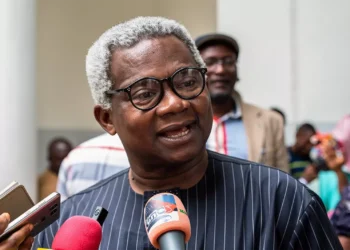Israel Joe, a prominent human rights activist from the Niger Delta region, has issued a compelling appeal to the federal government, urging equitable treatment in wages between politicians and civil servants. His call comes in the wake of President Muhammadu Buhari’s approval of a ₦70,000 minimum wage for civil servants, which Joe believes should also apply to politicians at all levels of governance.
In a statement released to journalists in Warri, Delta State, Comrade Joe passionately argued that if ₦70,000 is deemed sufficient for civil servants to sustain their livelihoods, it should likewise suffice for politicians. He emphasized the principle of equality, asserting that all citizens, whether in public service or governance, deserve fair and dignified compensation.
“The essence of democracy is equality and fairness,” Joe articulated, “and this principle should be reflected in the wages we assign to those who serve us in government.” He underscored that the fundamental rights to a decent standard of living and welfare should be equally accessible to every Nigerian, without distinction based on occupation or position in society.

Expressing a tone of disappointment rather than celebration, Joe cautioned workers against rejoicing over the minimum wage increase. He lamented, “My sincere view is that this minimum wage increment is insufficient to cover basic necessities such as a bag of rice, and we should not be celebrating what is essentially a cause for concern.”
Highlighting the broader economic context, Joe expressed dismay that a nation as resource-rich as Nigeria would set its minimum wage at a level equivalent to less than $50 per month. He condemned what he described as the institutionalization of servitude and likened the current conditions faced by workers to modern-day slavery.
Moreover, Joe extended his appreciation to the leadership of the Nigeria Labour Congress (NLC) and the Trade Union Congress (TUC) for their advocacy efforts, which he credited for securing a significant increase in the minimum wage. He praised their dedication to championing the rights and welfare of Nigerian workers, acknowledging their role in achieving a 100% wage hike.
In conclusion, Israel Joe’s impassioned plea for parity in minimum wages between politicians and civil servants underscores broader issues of economic justice and equitable distribution of resources in Nigeria.
His advocacy serves as a reminder of the ongoing struggle for fair treatment and dignified livelihoods for all citizens, regardless of their roles in society. As the nation moves forward, Joe’s words resonate as a call to action for policymakers to ensure that economic policies prioritize the well-being and prosperity of all Nigerians. Israel Joe’s advocacy for wage equality has sparked a crucial conversation about the need for fair compensation across different sectors in Nigeria. Building on this discussion, it is imperative to address not only the minimum wage disparity between politicians and civil servants but also the larger issue of income inequality within the country.

One area that warrants attention is the informal sector, where a significant portion of the Nigerian workforce operates without formal employment contracts or stable income sources. These individuals often face precarious working conditions and lack access to social security benefits, making them vulnerable to economic shocks and exploitation. Addressing the wage gap between formal and informal workers is essential for promoting inclusive growth and reducing poverty levels.
Furthermore, the gender pay gap remains a persistent challenge in Nigeria, with women earning less than their male counterparts for similar work. Implementing policies that ensure equal pay for equal work is crucial for advancing gender equality and empowering women in the workforce. By closing the gender wage disparity, Nigeria can harness the full potential of its female workforce and promote economic development.
In addition to wage equality, improving the overall quality of jobs is essential for enhancing the well-being of Nigerian workers. This includes ensuring safe working conditions, providing access to training and skill development opportunities, and promoting job security. By prioritizing decent work standards, the government can create a more sustainable and inclusive labor market that benefits all citizens.
As Nigeria continues its journey towards economic prosperity, addressing wage disparities and promoting fair compensation for all workers will be instrumental in fostering social cohesion, reducing poverty, and building a more equitable society. Israel Joe’s advocacy serves as a catalyst for change, inspiring stakeholders to work towards a more just and inclusive labor environment for the benefit of all Nigerians.




































